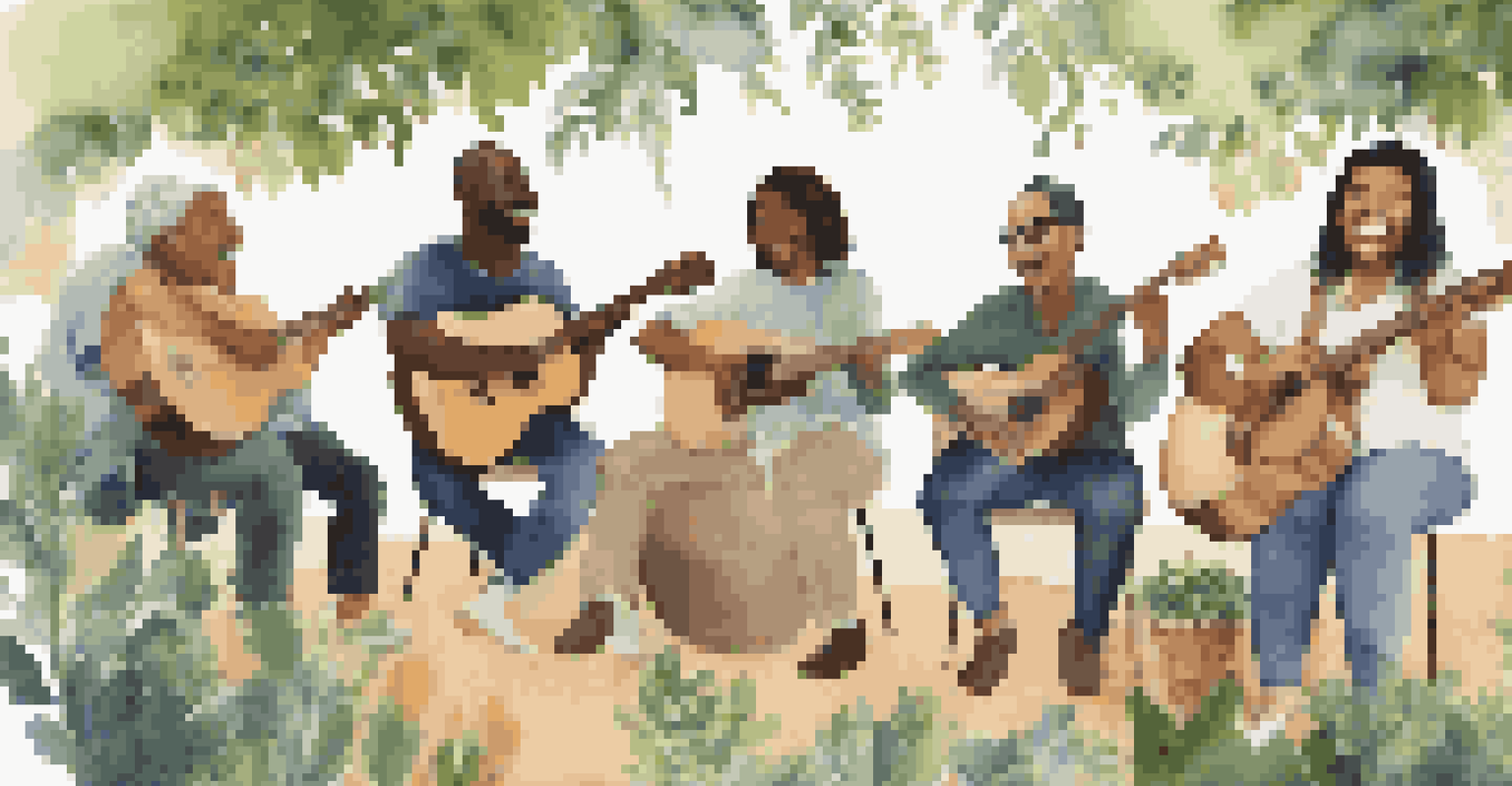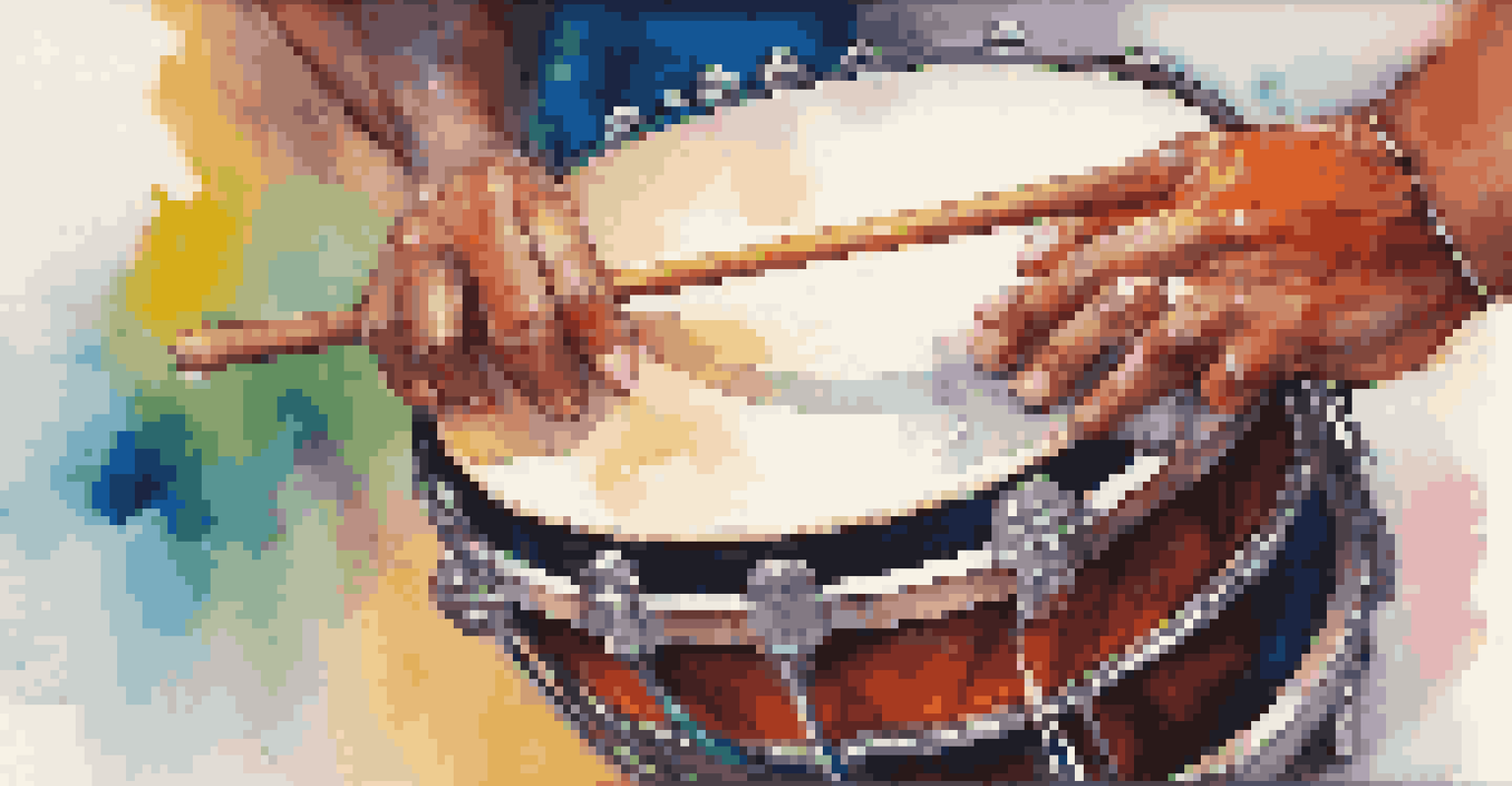Exploring the Role of Music in Holistic Healing Practices

Understanding Holistic Healing and Its Components
Holistic healing is an approach that considers the whole person, including their physical, emotional, and spiritual needs. It aims to balance these aspects to promote overall well-being. By integrating different healing methods, practitioners can tailor their approach to suit individual needs, making it a personalized journey.
Music can change the world because it can change people.
At its core, holistic healing recognizes that our mental state can significantly impact our physical health. This interconnectedness is why many practitioners incorporate various therapies, such as acupuncture, meditation, and, notably, music therapy, into their practices. Each method serves to nurture the body and mind in a comprehensive manner.
Music plays a particularly vital role in this landscape, acting as a universal language that resonates with people on multiple levels. By tapping into the emotional and psychological benefits of music, holistic healing can foster a more profound sense of connection and harmony within oneself.
The Science Behind Music and Healing
Research has shown that music can trigger a variety of physiological responses in our bodies. For instance, listening to soothing music can lower cortisol levels, which are associated with stress and anxiety. This biological connection highlights why music is considered an effective tool for promoting relaxation and emotional well-being.

Additionally, music stimulates the release of dopamine, often referred to as the 'feel-good' hormone. This natural boost can elevate mood and enhance feelings of joy, making music a powerful ally in holistic healing. By understanding these scientific principles, we can appreciate how music influences our health beyond just enjoyment.
Moreover, studies have demonstrated that music therapy can aid in pain management and improve recovery outcomes in patients. This scientific backing reinforces the idea that music isn't just a pleasant addition; it's a vital component of healing that can enhance traditional medical approaches.
Music Therapy: A Key Holistic Practice
Music therapy is a structured approach that uses music as a therapeutic tool to address emotional and physical challenges. Certified music therapists design personalized sessions that can include listening, songwriting, or playing instruments, depending on the client's needs. This tailored approach ensures that the therapy aligns with the individual's healing journey.
Where words fail, music speaks.
During music therapy sessions, clients may experience a range of emotions, helping them process feelings they might struggle to articulate otherwise. This emotional release can be incredibly therapeutic and serves as a reminder that healing is not just a physical journey; it's also deeply emotional. By providing a safe space to explore these feelings, music therapy fosters personal growth and resilience.
Additionally, music therapy can be beneficial in various settings, including hospitals, schools, and rehabilitation centers. Its versatility showcases how music can adapt to different environments and needs, making it an essential component of holistic healing practices.
The Role of Rhythm and Melody in Healing
Rhythm and melody are fundamental elements of music that can influence our emotions and physical responses. For example, a steady rhythm can help regulate heartbeats and breathing, promoting relaxation and calmness. This physiological response illustrates how music's structure can directly impact our body and mind.
Melody, on the other hand, can evoke powerful memories and emotions. A particular tune might transport someone back to a cherished moment, sparking feelings of joy or nostalgia. By harnessing these emotional connections, holistic practitioners can create meaningful experiences that facilitate healing.
Furthermore, engaging with rhythm and melody through active participation, such as drumming or singing, can enhance the healing process. This active involvement encourages individuals to express themselves creatively, reinforcing the idea that healing can be a joyous and liberating experience.
Cultural Perspectives on Music and Healing
Music has been an integral part of healing practices across various cultures for centuries. From ancient tribal rituals to modern therapeutic practices, the use of music reflects a universal understanding of its healing properties. This rich cultural tapestry highlights how music transcends boundaries and connects us to our shared humanity.
In many indigenous cultures, music is believed to hold spiritual significance, often used in ceremonies to invoke healing energies. This perspective emphasizes the importance of community and connection, reminding us that healing is often a collective experience. By respecting and incorporating these diverse viewpoints, modern holistic practices can expand their approach to healing.
Moreover, learning from different cultural practices can inspire innovative ways to integrate music into healing. As we explore these traditions, we can find new methods that resonate with our personal experiences, enriching our understanding of music's healing potential.
Creating a Personal Music Healing Practice
Establishing a personal music healing practice can be a rewarding journey towards self-discovery and well-being. Begin by identifying the types of music that resonate with you, whether it's soothing instrumental pieces or uplifting songs that make you want to dance. Understanding your preferences allows you to curate a playlist that supports your emotional and physical needs.
Incorporating music into your daily routine can be as simple as setting aside time for mindful listening or using music during meditation sessions. Creating a ritual around music can enhance its effectiveness as a healing tool, making it a cherished part of your self-care regimen. This intentional approach fosters a deeper connection with the music and its healing properties.
Additionally, consider exploring music-making as a form of therapy. Whether through singing, playing an instrument, or even songwriting, engaging in these activities can provide an outlet for expression and emotional release. This hands-on approach not only reinforces the healing benefits of music but also allows you to connect with your creativity.
The Future of Music in Holistic Healing
As our understanding of music's role in healing continues to evolve, we can expect to see more innovative approaches integrating music into holistic practices. With advancements in technology and research, new methods are emerging that harness the power of music therapy in exciting ways. These developments promise to enhance the effectiveness of healing practices across various settings.
The growing acceptance of alternative therapies, including music therapy, is paving the way for a more inclusive understanding of health and wellness. As holistic healing gains popularity, more individuals are recognizing the importance of addressing emotional and spiritual aspects alongside physical health. This shift encourages a more comprehensive approach to healing that embraces the benefits of music.

Ultimately, the future of music in holistic healing looks bright. By continuing to explore and expand our understanding of music's therapeutic potential, we can create a more harmonious balance between body, mind, and spirit, ensuring that healing is a holistic journey for everyone.